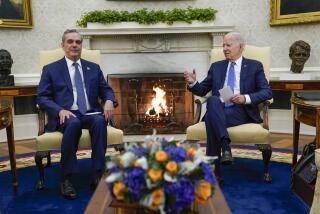New Trade Plan--Or Trade-Off? : * Bush’s Vague Latin Aid Strategy in the Age of Gramm-Rudman
With his new “Enterprise for Americas Initiative” President Bush hoped to reassure Latin America and the Caribbean that they will stay on his agenda in the post-Sandinista, post-Cold War 1990s. But to many Latin Americans, the gesture may look more like a consolation prize than a new Alliance for Progress.
Bush called for stepped-up trade to replace economic aid. An alluring vision, but, with the exception of debt-swapping, impractical as policy. The rough plan does not advance beyond vintage International Monetary Fund and U.S. Agency for International Development policy toward the region. Bush called for a hemispheric free-trade zone: An old idea usually stymied by U.S. legislators’ protectionist urges.
Latin America is more diverse than the initiative presupposes. Brazil will benefit if Washington lifts tariffs because it makes desirable goods, including computers. While destitute Haiti is best known for its baseballs. Meanwhile agrarian nations rack up trade deficits trying to pay for oil with overabundant cash crops such as coffee. Some are overwhelmed by civil war or postwar reconstruction.
Bush should look to Canada and Western Europe. Many of their aid programs target grass-roots development efforts that are heavy on technology transfer and light on free enterprise rhetoric. Scrutiny of the flow of U.S. aid in recent years might show that some of the least expensive aid programs were best able to steer clear of the social instability provoked by drastic austerity measures.
Gramm-Rudman legislation halted the days of ever-increasing U.S. aid and lending. The region is moving confidently toward financial liberalization. Trade barriers within the region are slowly being erased. Repeating the free-market mantra will not make the process any faster or less painful, and the President needs to spell out the details of his proposal. Right now it is an end goal--worthwhile, but not a blueprint for policy.
More to Read
Get the L.A. Times Politics newsletter
Deeply reported insights into legislation, politics and policy from Sacramento, Washington and beyond. In your inbox three times per week.
You may occasionally receive promotional content from the Los Angeles Times.










